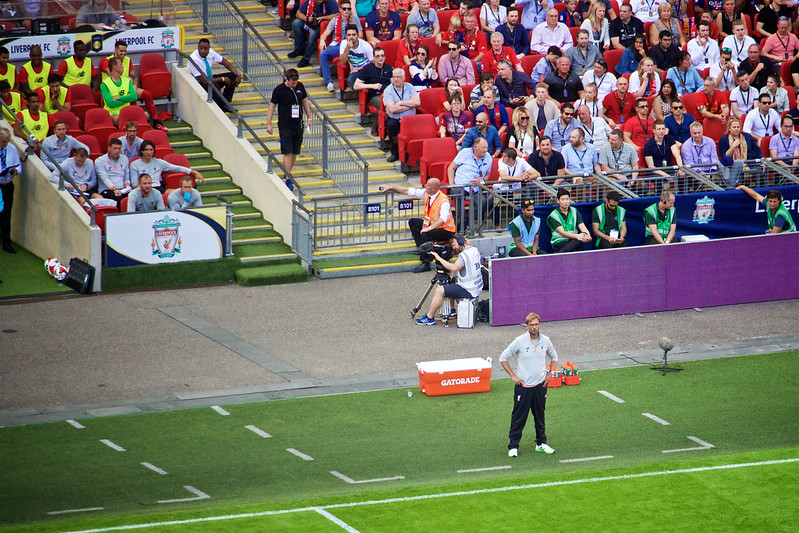Liverpool’s stormy victory over Manchester City was overshadowed by the controversy off the pitch. Some of it was in the stands, where once again rival fans taunted Liverpool about the Hillsborough Disaster, and some of it a couple days earlier in a press conference when Liverpool’s manager Jurgen Klopp was asked if it’s possible to compete with Man City.
Klopp delivered an answer that from the perspective of the sport’s health, was rather grim. He pointed out that there were three clubs in the world who could do as they pleased whereas everyone else could not. Where a club like Newcastle United now had no ceiling on their aspirations, everyone else was still operating within the constraints of their own wealth. It shouldn’t have been a controversial thing to say. The soul of football is being robbed by excess capitalism, and Man City, PSG and Newcastle have become subjects of sportswashing projects by Gulf states with bloodstained reputations.
In the past decade or so we have seen competitive domestic Spanish games hosted in the Gulf region. We have seen Qatar win the bidding rights for the 2022 World Cup which it then built upon a legacy of brutal exploitation of South Asian workers. The game has radically changed as a result. Klopp’s comments should have reflected what everyone already knew. Only a few months ago the world protested the Super League idea because of how it would destroy the principle of competition. This would change football in a recognisable way by turning clubs into franchises. But the gradual destruction of football by Gulf states buying up clubs has been far less easy to identify even though its effects are even worse.
As the Premier League grows in wealth, the rest of the football pyramid in England is suffering as a result. As Manchester City continues to expand their dominance, a few miles away, a small but proud club, Bury FC, a community institution went into a financial crisis, expelled from the English Football League, and then later placed into administration. Their local rivals Oldham FC, similarly, encountered financial distress and were subsequently relegated into non-League football. Their contrasting fortunes with Man City, all three within a similar geographical orbit to each other, speaks of the mass inequalities in English football separating the Premier League from the rest.
The Conservative government spoke about changes after the Super League’s disastrous launch but it was later revealed that the then Prime Minister Boris Johnson met the CEO of Manchester United only days before. With Keir Starmer’s Labour looking increasingly likely to storm into power at the next General Election, what could a Labour government do to save English football from capitalist vultures?
The most referred solution is the 50+1 concept which currently exists in German football. This would give football fans a form of democratic control over their clubs and ensure that key decisions include them within the decision-making process. In Germany, this has allowed for a football culture of cheaper ticket prices and greater atmospheres. Considering how fans rebelled against the Super League project, the democratisation of English football would provide a control that has been ripped away from them with the great influx of Premier League wealth.
But the 50+1 rule has become a panacea. Even with this rule in place, would it have stopped unethical takeovers of football clubs by foreign states? This is something the Premier League must take into consideration. The government placed sanctions upon Chelsea’s former owner Roman Abrahamovic for his involvement with the Russian state, but there are no such sanctions upon those controlling Man City and Newcastle who are directly affiliated with two regimes complicit in endless human rights abuses. A Labour government cannot ignore this if it wants to protect the soul of English football. Mike Ashley being a bad owner for Newcastle does not then justify approving the Saudi takeover of the club.
There is also the fundamental matter of protecting clubs within lower leagues from liquidation. Does this involve a greater redistribution of wealth where lower leagues enjoy an increase in TV exposure, or does the government make sure that every professional league is adequately funded to ensure that relegation does not necessarily mean oblivion as an institution for these football clubs? Greater funding within domestic cups would also be a way of revitalising historic competitions dying in their significance whilst providing important revenues for smaller clubs.
A Labour government would have to look at ways in which a more egalitarian football culture is born, where clubs in the Championship, League One and League Two are financially protected even if there is a small ceiling on their ambitions. This might be part of a broader levelling-up agenda. It’s worth noting that football clubs within the major English cities aren’t going out of business, even within the lower leagues. It’s the abandoned towns and their abandoned football clubs which have faced a lonely struggle against the consequences of economic globalisation within the game.
For any of this to happen there must be bipartisanship over tribalism. This is often hard to achieve in football. Manchester City and Chelsea fans protested against the Super League yet both are guilty of justifying their clubs’ successes despite the unethical sources of their wealth. Jurgen Klopp spoke concisely about why football could not compete with state-owned clubs yet was derided online, and was accused of xenophobia by anonymous Manchester City sources. But it is hard to refute that if the growing inequalities within English football are not confronted, the game as we know it will be permanently lost.


